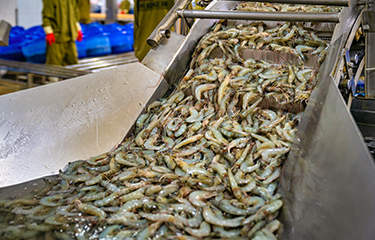US International Trade Commission gives green light to shrimp import investigation

The U.S. International Trade Commission (ITC) has voted to continue investigating frozen warmwater shrimp imports from Ecuador, India, Indonesia, and Vietnam to determine whether the U.S. should implement antidumping and countervailing duties.
The commission’s vote comes after a petition from the American Shrimp Processors Association (ASPA) that claims imports from those four countries are materially harming domestic shrimpers. After the ITC’s vote, both the commission and the U.S. Department of Commerce will conduct investigations.
“Today's vote validates the data in ASPA's petitions demonstrating that imports from Ecuador, India, Indonesia, and Vietnam have taken market share from domestic producers, deeply undercut prices, and caused serious harm to domestic shrimp processors and shrimp harvesters alike,” ASPA President Trey Pearson said following the ITC’s vote. “These unfair imports have thrown our entire industry into crisis, and I thank the ITC for allowing these important cases to continue."
The ITC’s vote follows its decision earlier this year to maintain antidumping duties on shrimp from India, China, Thailand, and Vietnam.
The investigation is part of a multi-faceted campaign from U.S. lawmakers and the domestic shrimp industry to crack down on imported shrimp.
Several communities and government officials have declared an emergency over shrimp imports. The Southern Shrimp Alliance wrote a letter to eight Southern governors earlier this year asking them to declare an emergency and request financial assistance from NOAA Fisheries.
U.S. Senator Bill Cassidy (R-Louisiana) has introduced legislation designed to neutralize the Indian government’s subsidization of its shrimp sector. If passed, the bill would raise U.S. tariffs on Indian shrimp imports to offset those subsidies.
Last week, U.S. Customs and Boder Protection (CBP) announced that it was distributing just USD 3,870 (EUR 3,600) to the domestic shrimping sector through the Continued Dumping and Subsidy Offset Act (CDSOA) program. Passed in 2000 and repealed in 2007, CDSOA directs CBP to distribute the anti-dumping and countervailing duties it collects to domestic producers injured by foreign subsidies and dumping. Due to its repeal, the program can only distribute funding from the duties it collects on foreign shrimp that entered the U.S. before 1 October 2007.
According to the Southern Shrimp Alliance, CBP has distributed USD 272 million (EUR 253 million) through CDSOA to the shrimp industry since fiscal year 2006, but the annual disbursements have continued to dwindle over time as the agency has completed processing all the imports that are subject to the program.
Money from duties collected since 1 October 2007 is not set aside to help the domestic shrimp industry; Instead the money goes to the U.S. Treasury with 30 percent earmarked for funding NOAA Fisheries. However, some U.S. lawmakers are hoping to change that.
Last week, Cassidy and U.S. Senator Tammy Baldwin (D-Wisconsin) introduced the Resilient Communities Act, which would direct the secretary of commerce to distribute the collected funds to communities that have been injured by trade.
“Louisiana shrimpers have a great story to tell. Their shrimp is fresher, cleaner, and tastes better,” Cassidy said. “This is an important step towards protecting the families that rely on Louisiana’s seafood industry and ensuring that their communities prosper no matter how much China and India try to dump into U.S. markets.”
ASPA has endorsed the legislation.
“This bill could make a huge difference for the domestic shrimp industry, which has been fighting unfairly traded imports for almost twenty years,” ASPA said in a statement. “Tariffs help tame import prices and volumes, and the revenue they generate should also be re-invested in the domestic industries that have suffered lost sales, production, and jobs due to dumped and subsidized imports.”
According to the Southern Shrimp Alliance, CBP collected USD 44 million (EUR 41 million) in antidumping duties on shrimp in fiscal year 2022. The organization estimates that the agency collected between USD 340 million (EUR 316 million) and USD 500 million (EUR 465 million) between 2014 and 2022.
A separate piece of legislation – the Laws Ensuring Safe Shrimp (LESS) Act – was introduced by U.S. Representative Garret Graves (Louisiana) and U.S. Representative Kathy Castor (D-Florida) in August. The LESS Act would set aside 70 percent of the duties collected for the “Inspection and Consumption of Shrimp and Shrimp Products Fund,” which would be used to support Food and Drug Administration efforts to eliminate illegal antibiotics from shrimp in the U.S. and purchase domestic shrimp for government food distribution programs.
“From foreign shrimp dumping to skyrocketing energy costs and Hurricane Ida, Louisiana’s shrimpers have been hit by both man-made and natural disasters. Shrimp packed with illegal antibiotics cannot be allowed to take over our market, and it’s unacceptable to be okay with anyone consuming a lower-quality product that puts their health at risk. This is an avoidable hardship for one of Louisiana’s biggest economic drivers and that’s why we are pushing this legislation,” Graves said.
That legislation is supported by both the Southern Shrimp Alliance and ASPA.
“Pushed to the margins by cheap shrimp tainted with harmful chemicals, shrimpers are struggling to sell their catch and are confronting one of the worst years this industry has ever experienced. The LESS Act is proof that Congress has a vital role in the continued viability of our shrimp industry,” Southern Shrimp Alliance Executive Director John Williams said. “Rep. Garret Graves (R-LA) and Rep. Kathy Castor (D-FL) have proposed a brilliant, creative approach to help our fishermen by using funds that our industry has largely generated for the federal government.”
Photo courtesy of Shutterstock / Nguyen Quang Ngoc Tonkin





Share